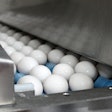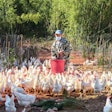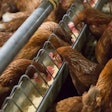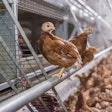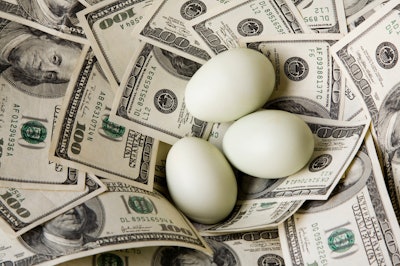
Global egg prices are forecast to stay elevated into 2024 due to ongoing highly pathogenic avian influenza (HPAI) outbreaks, elevated feed prices, government regulations and rising interest rates, according to financial services company Rabobank’s June 2023 egg inflation report.
While egg prices have started to decline in some regional markets, such as the U.S., prices across other countries will likely stay inflated into next year. The main exception to this is the U.S., where egg prices have reduced significantly.
“The key issue there is that consumers have reduced egg consumption at a time when farms are transitioning toward cage-free production while old capacity is still operational, leading to high production. Meanwhile, a sudden drop in the number of avian flu cases in commercial laying hen farms has resulted in more supply than expected. Prices are expected to recover later in the year when market balance returns,” stated Nan-Dirk Mulder, Rabobank Senior Analyst – Animal Protein.
“The U.S. situation is expected to be an exception worldwide. Prices will stay especially high and increasingly volatile in markets heavily impacted by avian influenza, high feed costs, and regulatory changes. In other markets, prices will drop but not to pre-2021 levels, as lingering high input costs will keep prices elevated.”
Outside the U.S.
Egg producers around the globe have faced disease, cost inflation and regulation, which has resulted in supply chain disruptions and high price peaks.
According to Rabobank, ongoing cases of HPAI where layer hen number are still low, such as in Japan, are still inflating egg prices. In the past, the virus disappeared in the summer months after migration. However, HPAI has spread to other bird types and persisted longer than expected.
Feed prices are forecast to stay elevated throughout the year. Rabobank’s May 2023 feed price outlook shows a 10% reduction from 2022’s highs, but ongoing elevated prices of 50% above 2020’s levels.
Inflation rates are still affecting egg producers as well, which could restrict access to working capital and impact industry expansion. In addition to inflation, Rabobank believes that industry expansion will be reduced due to regulation.
For example, trade in Europe is currently impacted by male chick culling regulations. Additionally, the Netherlands cannot expand its production due to nitrogen regulations to reduce emissions, which affects Germany, as it is a key supplier for the country.









